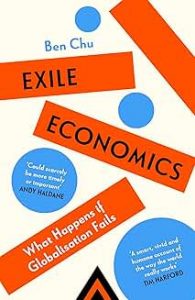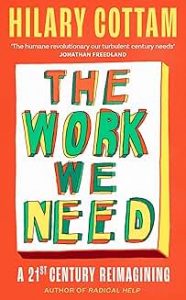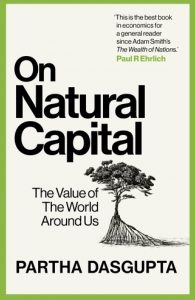The weeks shoot past, and here I am again doing a catch-up – I blame the end of term, and a week of lectures at the University of Bayreuth, as well as general day job activities. Anyway, I’ve read a few excellent – and varied – economics books along with a selection of fiction.
First up, Ben Chu’s Exile Economics. This is an excellent overview of the changing global order, and the turn from globalisation to autarky (or ‘exile economics’, even if more in rhetoric than reality even now. The book begins with the intellectual and political origins of this turn, braiding together events like the financial crisis with the multiple strands of thinking that make up modern Trump-style autarky. Successive chapters then use a particular theme as a lens on the shift from acceptance of global interdependence to the idea of self-reliance: for example, food, energy, people, medicine.
The final chapter is bravely titled “The Future”. It ends with a telling story about the young Ben Chu visiting China with his family for the first time, in 1985. He was shocked by the low standard of living of his relatives in Guangzhou – a standard utterly transformed for the better by globalisation. But the vulnerabilities and economic failures created by globalisation are clear. It has failed to deliver for many people, as opposed to corporates. Some countries have certainly seen a hollowing out of their production capabilities in important sectors. Yet – he writes – “When I began researching this book I was sceptical of the case for dismantling global supply chains. Now my sense is that anyone who advocates it … has simply not examined these supply chains closely enough.” The book ends with a plea for policymakers to focus on developing economic strengths rather than on weakening interdependencies. We will see. A really interesting read, enlivened by the author’s reporting and a lovely writing style.
 I suppose Hilary Cottam’s The Work We Need could be read as an antidote to the casualties of the globalised economies. Its question is how to redesign the future of work, particularly for those in low-paid or insecure or unpleasant or disrespected jobs and communities. The book draws from a series of community events she organised in the UK and US, Imaginings. These events asked participants to redesign their working lives. What form would work take, and what would be needed to enable change? Six themes emerged, getting a chapter each: Basics – enough to live on; Meaning; Care and repair; Time; Play; and Place. The chapter on time was particularly interesting to me, as I’ve been for a while thinking about the use of time as a better way of accounting for what’s happening in the economy. It crops up in discussions about hybrid work and the four day week. Digital platforms torpedo workers’ control over their time.
I suppose Hilary Cottam’s The Work We Need could be read as an antidote to the casualties of the globalised economies. Its question is how to redesign the future of work, particularly for those in low-paid or insecure or unpleasant or disrespected jobs and communities. The book draws from a series of community events she organised in the UK and US, Imaginings. These events asked participants to redesign their working lives. What form would work take, and what would be needed to enable change? Six themes emerged, getting a chapter each: Basics – enough to live on; Meaning; Care and repair; Time; Play; and Place. The chapter on time was particularly interesting to me, as I’ve been for a while thinking about the use of time as a better way of accounting for what’s happening in the economy. It crops up in discussions about hybrid work and the four day week. Digital platforms torpedo workers’ control over their time.
The Work We Need is an inspiring book, and it does end with a call for a radical rethink of how the world of work – and therefore most people’s days – is organised. A chapter on ‘The Just Transition’ makes the case for the scope for intellectuals, enlightened intellectuals and governments to bring about a shift. It’s an optimistic end; Hilary writes: “Injustice is acute, divisions between geographies are deep, political populism grows and the lived realities for many are painful.” She sees this as evidence for a turning point. I applaud the optimism – but it does seem a world away from the prevailing conversation about work, namely how many jobs will be eaten by AI.

Something completely different: A Modern Economic History of Japan by Russell Jones. The author wrote an excellent modern economic history of the UK a while ago, The Tyranny of Nostalgia. This new book is just as interesting, beginning with a bit of the prewar history but focusing on the postwar era to Abenomics. It takes a macroeconomic perspective, so most of this was new to me, as the little I know about Japan concerns industrial policy, the supply side. Russell Jones spent years working in Japan and this shows in his sensitivity to the way the country’s history shaped modern policy choices. I don’t feel qualified to comment on the analysis, as a very much non-macro person, but I learned a lot.
 Transitioning from economics to my broader reading, I polished off Fiona Hill’s memoir There is Nothing For You Here. She grew up in a working class family in the north east of England and ended up as a Russia expert, a scholar at Harvard and a Washington insider, working – albeit briefly and not happily – for the first Trump administration. So it’s a fantastic read as a personal saga. The point of the book, though, is how to begin to tackle what has gone wrong for the past 40 years and more for the kind of community she grew up in, and thus how to tackle some of the root causes of divisive populism.
Transitioning from economics to my broader reading, I polished off Fiona Hill’s memoir There is Nothing For You Here. She grew up in a working class family in the north east of England and ended up as a Russia expert, a scholar at Harvard and a Washington insider, working – albeit briefly and not happily – for the first Trump administration. So it’s a fantastic read as a personal saga. The point of the book, though, is how to begin to tackle what has gone wrong for the past 40 years and more for the kind of community she grew up in, and thus how to tackle some of the root causes of divisive populism.
Finally, some other reads in between:
Challenger by Adam Higginbotham. Utterly gripping account of the technical, organisational and personality contributors to the tragedy of the 1986 launch explosion.
Paper Cage by Tom Baragwanath – a very readable thriller set in a Maori community.
Fortress of Evil by Javier Cercas – final book in the Tera Alta trilogy; I loved these.
On The Calculation of Volume I by Solvej Balle. Weird. A sort of groundhog day tale of nothing happening. Not my cup of tea.
Gabriel’s Moon by William Boyd. Excellent accidental spy romp.
A Case of Matricide by Graeme Macrae Burnet. Another part three of a trilogy, the dark side of dull small town life in France. I enjoyed them but they might be an acquired taste.
Broken Threads by the wonderful Mishal Husain. Another page turner, a family memoir covering the end of British empire in the Indian subcontinent and the horrors of the 1947 partition.







